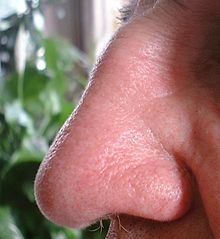stink
Stink (as in Middle High German stinken, from Old High German stinkan : stink, bad smell, originally - until the early Middle Ages - emit a smell, smell) is an olfactory perception that is perceived as unpleasant, with a mostly repulsive effect due to putrid or oozy smell that leads to disgust can lead.
perception
This sensation is based on a protective instinct that has been preserved in humans , which should protect them from ingesting spoiled and poisonous things (cf. bromine ). The human nose is the olfactory organ for smelling perception.
For many substances, it depends on the concentration whether they are perceived as pleasant or unpleasant. For example, skatole (the main cause of the odor of feces ) smells pleasant in low concentrations and is therefore added in traces to perfumes . The relationship of the perceiver to what smells also plays a role - e.g. B. in sexuality - an important role.
The intensity of smells, and thus also of stench, is perceived very differently from person to person, but it can be compared by measuring emissions . The relevant parameter for physiological perception is the European olfactory unit .
Examples
Odors often arise as a result of decomposition processes in which putrefactive bacteria play a role. In biology , stinking fragrances are either a means to ward off predators or are used as an attractant for scavenging organisms. Arguably the animal most commonly associated with it is the skunk . But also in the insect world z. B. the green stink bug known to smell unpleasant.
Stink often arises from
- decaying fruit , meat and other foods such as sour milk or rancid butter (see putrefaction processes )
- Emission of digestive gases in humans and animals ( flatus )
- bacterial decomposition of sweat , menstrual blood , vomit
- Set cigarette smoke in clothing and rooms
- Putrefaction of carrion , manure
- Insect attracting scents from plants and fungi (carrion odor), e.g. B. Stinkhorn
- animal scent brands (see the civet cat )
- Application of defense mechanisms by animals, e.g. B. Skunk
- chemical reactions z. B. combustion or as irritant gases such as butyric acid , hydrogen sulfide in stink bombs , sulfur dioxide etc.
- Poor personal hygiene and the resulting excessive body odor
See also
- The Great Stink , London (1858)
Word usage
Scientists used to believe that the plague and other diseases were transmitted through a stench or bad smell called a miasma .
Relevant idioms in German are : "He stinks like a hoopoe " or "Like a dead Cossack out of his pocket"; see. also "make a stink" (for: to instigate a quarrel ) and "a stink of hell" (which also reveals a popular conception of hell ). Especially in southern Germany it is said: “Handkäs stinks from both sides” - a saying that says that you don't find anything good about something.
Metaphorically , mistrust or suspicion is also denoted by: "Something stinks in this business"; or Lieschen to Gretchen in Goethe's Faust (while gossiping about another girl): “It stinks. | She feeds two when she eats and drinks. "
Romania is discussing a law banning the production of stink.
literature
- Alain Corbin: breath of plague and scent of flowers. A history of smell , 2nd edition 1994
- Annick LeGuérer: The power of smells. A philosophy of the nose , Stuttgart 1992
Web links
Individual evidence
- ↑ Max Höfler : The smell from the standpoint of folklore. In: Journal of the Association for Folklore. Volume 3, 1893, pp. 438-448; here: p. 443.
- ↑ DIN EN 13725: 2003-07 air quality; Determination of the odor concentration with dynamic olfactometry; German version EN 13725: 2003. Beuth Verlag, Berlin. P. 18.
- ↑ Romania: Debate on the law against stink orf.at, December 22, 2017, accessed December 23, 2017.
